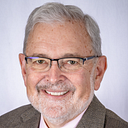Vernon Grounds Worked Past Age 90

When I first noticed Vernon Grounds, I had no idea who he was, or that he was a national leader in American Evangelical Christianity. He was the cute little old man who seemed to live at our local YMCA, where he could be seen exercising most days. He always smiled warmly and had a sparkle in his eye.
Many years later, Dr. Grounds led a weekend retreat for our Presbyterian church’s adult Sunday school class. Early in the retreat his wife Ann came up, and in that tone a wife most often uses to tell a husband his fly is open said “Vernon, your brains are showing.” He immediately glanced down, where the largest Phi Beta Kappa key, at least 1 1/2 inches high, that I have ever seen was dangling out of his pants pocket on a watch chain.
While he held firm to his core beliefs, Dr. Grounds had a subtle and well-developed sense of theological humor. He seemed a delightful, unassuming, and humble man as he led the retreat that weekend. However, it was obvious from his quick wit and intellectual acumen why he held a Phi Beta Kappa key.
Early in his career Dr. Grounds was a Baptist pastor in Paterson, New Jersey, but he soon moved on to higher education. After a stint teaching in a Baptist seminary in New York, he accepted a position as dean and later president of Conservative Baptist Theological Seminary, later renamed Denver Seminary. Under his leadership the school grew from 30 to 300 students. In the 1960’s he challenged his fellow evangelicals to help the disenfranchised and poor, which was a scandalously radical idea at the time.
He retired at age 65 but continued to come to work as president emeritus and later chancellor. He continued to travel, speak, teach, write, and counsel individuals. In his travels he often saw human suffering and injustice up close.
He remained intellectually alert as his body began to fail. A group of men volunteered to be his personal assistants. Each man would take a day a week to pick Dr. Grounds up from his home, drive him to his office at the seminary, then assist him throughout the day.
According to Scott Wenig, a Denver Seminary professor, “[Dr. Grounds] was never a strong administrator. [He] was wise enough to admit that his job was ‘not to ride herd on details or be a fundraiser but to be a catalyst, interpreter, planner and an agent of reconciliation.’ He showed that he was all these things and more by his long, fruitful, life of loving service and godly influence in the cause of Christ.” (Christianity Today, November 17, 2010).
Dr. Grounds retired from a paycheck at age 65, but continued to work, serving his former employer on a volunteer basis. He worked until a short time before his death at age 96.
Some questions:
Dr. Grounds was an exceptionally talented and gifted individual. He knew what he was good at, but he also knew what he was not good at. What are your unique strengths? Your unique weaknesses? What action could you take this week to delegate a weakness to another team member more suited?
Are you open to continue to travel to experience the world? To somewhere other than a tourist destination?
As you age and perhaps experience physical limitations, is there a way you could plan to adapt and remain productive?
Finally, do you know someone who is working past age 65? I would love to meet them and hear their story. I may be reached at russ@strategicexit.com





